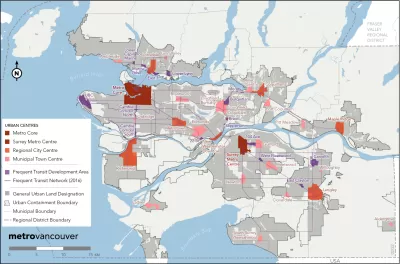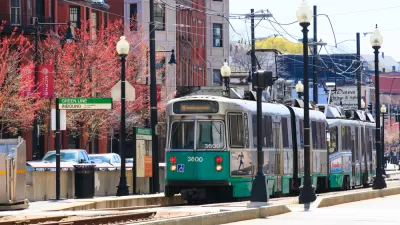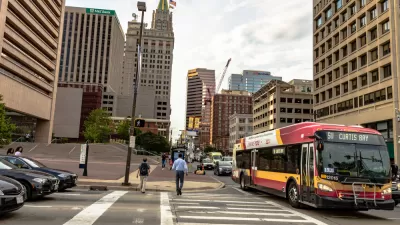The region around Vancouver in British Columbia has a new 30-year regional plan.

The Vancouver, British Columbia region wrapped up a major long-range planning initiative, titled Metro 2050, at the end of February. The region updates its long-range plan every ten years.
“Metro Vancouver has passed its regional growth strategy for the next 30 years, based on estimates that a million more people will be calling this region home by 2050,” reports Joanne Lee-Young for the Vancouver Sun.
“The years-long process for updating the Metro Vancouver region’s master plan, now called Metro 2050, culminated with Friday’s final approval of the strategy by Metro Vancouver Regional District’s board of directors, comprised of the region’s elected municipal officials,” reports Kenneth Chan for the Daily Hive in an article that headlines the plans focus on transit oriented development and new housing options
“The newly revised livable region strategic plan differentiates from past plans by focusing on adding much-needed housing supply to the region — a wide range of housing types for different incomes, especially rental housing, and the generation of such new housing supply through transit-oriented development,” adds Chan.
The Metro 2050 website lists five goals for the plan:
- Create a compact urban area
- Support a sustainable economy
- Protecting the environment, address change, and respond to natural hazards
- Provide diverse and affordable housing choices
- Support sustainable transportation choices
The website also notes that the plan does not change any boundaries on regional land use designations or the region’s Urban Containment Boundary (i.e., Vancouver’s version of urban growth boundaries).
FULL STORY: Metro Vancouver approves regional plan focused on transit-oriented housing

Planetizen Federal Action Tracker
A weekly monitor of how Trump’s orders and actions are impacting planners and planning in America.

Maui's Vacation Rental Debate Turns Ugly
Verbal attacks, misinformation campaigns and fistfights plague a high-stakes debate to convert thousands of vacation rentals into long-term housing.

San Francisco Suspends Traffic Calming Amidst Record Deaths
Citing “a challenging fiscal landscape,” the city will cease the program on the heels of 42 traffic deaths, including 24 pedestrians.

Amtrak Rolls Out New Orleans to Alabama “Mardi Gras” Train
The new service will operate morning and evening departures between Mobile and New Orleans.

The Subversive Car-Free Guide to Trump's Great American Road Trip
Car-free ways to access Chicagoland’s best tourist attractions.

San Antonio and Austin are Fusing Into one Massive Megaregion
The region spanning the two central Texas cities is growing fast, posing challenges for local infrastructure and water supplies.
Urban Design for Planners 1: Software Tools
This six-course series explores essential urban design concepts using open source software and equips planners with the tools they need to participate fully in the urban design process.
Planning for Universal Design
Learn the tools for implementing Universal Design in planning regulations.
Heyer Gruel & Associates PA
JM Goldson LLC
Custer County Colorado
City of Camden Redevelopment Agency
City of Astoria
Transportation Research & Education Center (TREC) at Portland State University
Jefferson Parish Government
Camden Redevelopment Agency
City of Claremont





























